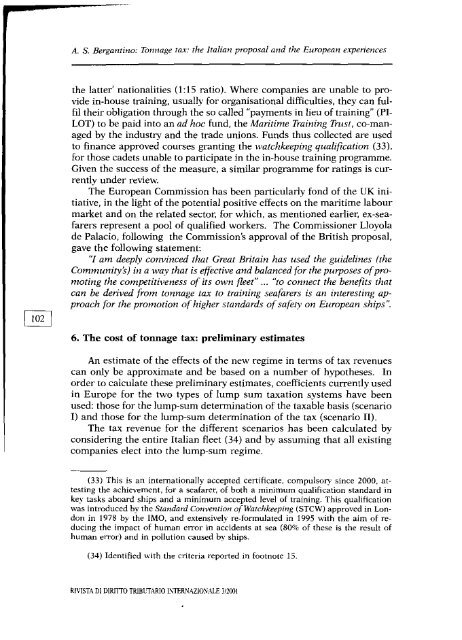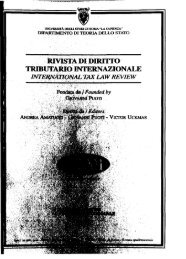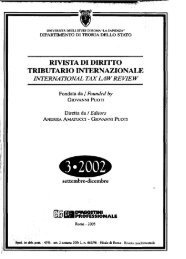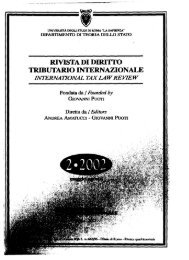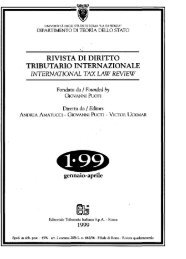RIVISTA DI DIRITTO TRIBUTARIO INTERNAZIONALE - Rdti.it
RIVISTA DI DIRITTO TRIBUTARIO INTERNAZIONALE - Rdti.it
RIVISTA DI DIRITTO TRIBUTARIO INTERNAZIONALE - Rdti.it
Create successful ePaper yourself
Turn your PDF publications into a flip-book with our unique Google optimized e-Paper software.
A. S. Bergantino: Tonnage tax: the Italia n proposal and the European experiences<br />
the latter' national<strong>it</strong>ies (1: 15 ratio). Where companies are unable to provide<br />
in-house training, usually for organisational difficulties, they can fulfil<br />
their obligation through the so called "payments in lieu of training" (PI<br />
LOT) to be paid into an ad hoc fund, the Mar<strong>it</strong>ime Training Trust, co-managed<br />
by the industry and the trade unions. Funds thus collected are used<br />
to finance approved courses granting the watchkeeping qualifìcation (33),<br />
for those cadets unable to participate in the in-house training programme.<br />
Given the success af the measure, a similar pragramme far ratings is currentIy<br />
under review.<br />
The European Commission has been particularly fond of the UK in<strong>it</strong>iative,<br />
in the light of the potential pos<strong>it</strong>ive effects on the mar<strong>it</strong>ime labour<br />
market and on the related sector, for which, as mentioned earlier, ex-seafarers<br />
represent a pool of qualified workers. The Commissioner Lloyola<br />
de Palacio, following the Commission's approvai of the Br<strong>it</strong>ish proposal,<br />
gave the following statement:<br />
"[ am deeply convinced that Great Br<strong>it</strong>ain has used the guidelines Ithe<br />
Commun<strong>it</strong>y's) in a way that is effective and balanced for the purposes of promoting<br />
the compet<strong>it</strong>iveness of <strong>it</strong>s own f/eet" ... "/o connect the benefìts that<br />
can be derived from tonnage tax to training seafarers is an interesting approach<br />
for the promotion of higher standards of safety on European ships ".<br />
6. The cost of tonnage tax: preliminary estimates<br />
An estimate of the effects of the new regime in terms of tax revenues<br />
can only be approximate and be based on a number of hypotheses. In<br />
order to calculate these preliminary estimates, coefficients currently used<br />
in Europe for the two types of lump sum taxation systems have been<br />
used: those for the lump-sum determination of the taxable basis (scenario<br />
Il and those for the lump-sum determination of the tax (scenario II).<br />
The tax revenue for the different scenarios has been calculated by<br />
considering the entire Italian fleet (34) and by assuming that ali existing<br />
companies elect into the lump-sum regime.<br />
(33) This is an internationally accepted certificate, compulsory since 2000, attesting<br />
the achievement, far a seafarer, of both a minimum qualification standard in<br />
key tasks aboard ships and a minimum accepted level of training. This qualification<br />
was introduced by the Standard Convention ofWatchkeeping (STCW) approved in London<br />
in 1978 by the IMO, and extensively re-formulated in 1995 \v<strong>it</strong>h the aim of reducing<br />
the impact of human error in accidents at sea (80 0 /c of these is the result of<br />
human error) and in pollution caused by ships.<br />
(34) Identified w<strong>it</strong>h the cr<strong>it</strong>eria reported in footnote 15.<br />
<strong>RIVISTA</strong> <strong>DI</strong> <strong>DI</strong>RfITO TRIBLTTARIO I\TERNAZIO:\A1E 3/2001


